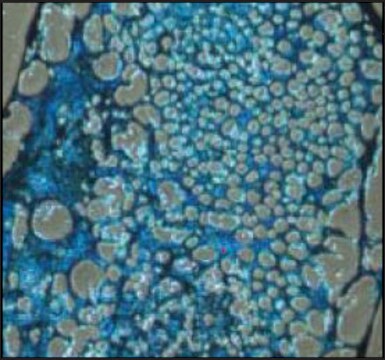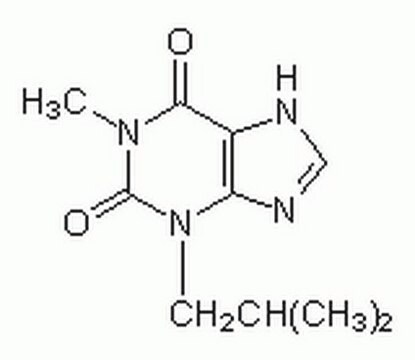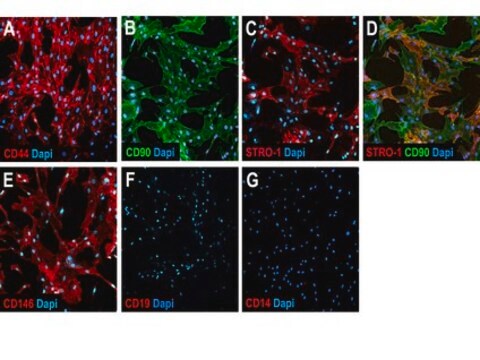추천 제품
Quality Level
제조업체/상표
Chemicon®
기술
cell culture | stem cell: suitable
입력
sample type mesenchymal stem cell(s)
일반 설명
Introduction:
Excessive weight gain and obesity pose significant health challenges to many industrialized nations. Many metabolic disorders associated with cardiovascular diseases such as diabetes and atherosclerosis are directly linked to the increased production and size of adipose cells. Understanding the molecular mechanism that underlie adipogenesis, the process by which adipose or fat tissue is formed, is thus of critical importance. Elucidation of the steps involved in adipogenesis, including terminal differentiation, have been facilitated in large part by the development of pre-adipocyte cell lines such as the Swiss 3T3-L1 mouse model (Please refer to CHEMICON′s Adipogenesis Assay Kit, Catalog No. ECM950). However using these model systems to study some of the earliest events in cellular differentiation are problematic as these cells are already lineage-restricted and pre-determined to become adipocytes.
Stem cell technology, particularly embryonic stem cells and/or mesenchymal stem cells offer attractive alternative sources of adipocytes for tissue culture studies and for the biochemical dissection of the earliest steps involved in adipose cell determination. Mesenchymal stem cells are multipotent progenitor cells that have the capacity to differentiate into several mesenchymal cell lineages, including bone, cartilage and fat.
Millipore′s Mesenchymal Stem Cell Adipogenesis Kit contains reagents that readily differentiate mesenchymal stem cells to an adipogenic lineage as assessed with Oil Red O staining of lipid vacuoles in mature adipocytes. These factors include dexamethasone, IBMX, insulin and indomethacin. Along with Oil Red O staining solution, a hematoxylin solution is provided to counterstain the cell nucleus.
Using Millipore′s Mesenchymal Stem Cell Adipogenesis Kit, we typically obtain >30% mature adipocytes from the rat bone marrow derived mesenchymal stem cells. Efficiency of adipogenic differentiation may vary, depending upon the quality of the mesenchymal stem cells and if variations to the protocol are introduced.
For Research Use Only; not for use in diagnostic procedure.
Excessive weight gain and obesity pose significant health challenges to many industrialized nations. Many metabolic disorders associated with cardiovascular diseases such as diabetes and atherosclerosis are directly linked to the increased production and size of adipose cells. Understanding the molecular mechanism that underlie adipogenesis, the process by which adipose or fat tissue is formed, is thus of critical importance. Elucidation of the steps involved in adipogenesis, including terminal differentiation, have been facilitated in large part by the development of pre-adipocyte cell lines such as the Swiss 3T3-L1 mouse model (Please refer to CHEMICON′s Adipogenesis Assay Kit, Catalog No. ECM950). However using these model systems to study some of the earliest events in cellular differentiation are problematic as these cells are already lineage-restricted and pre-determined to become adipocytes.
Stem cell technology, particularly embryonic stem cells and/or mesenchymal stem cells offer attractive alternative sources of adipocytes for tissue culture studies and for the biochemical dissection of the earliest steps involved in adipose cell determination. Mesenchymal stem cells are multipotent progenitor cells that have the capacity to differentiate into several mesenchymal cell lineages, including bone, cartilage and fat.
Millipore′s Mesenchymal Stem Cell Adipogenesis Kit contains reagents that readily differentiate mesenchymal stem cells to an adipogenic lineage as assessed with Oil Red O staining of lipid vacuoles in mature adipocytes. These factors include dexamethasone, IBMX, insulin and indomethacin. Along with Oil Red O staining solution, a hematoxylin solution is provided to counterstain the cell nucleus.
Using Millipore′s Mesenchymal Stem Cell Adipogenesis Kit, we typically obtain >30% mature adipocytes from the rat bone marrow derived mesenchymal stem cells. Efficiency of adipogenic differentiation may vary, depending upon the quality of the mesenchymal stem cells and if variations to the protocol are introduced.
For Research Use Only; not for use in diagnostic procedure.
애플리케이션
Research Category
Stem Cell Research
Stem Cell Research
성분
Dexamethasone Solution: (Catalog No. 90357) One vial containing 100 μL of 10 mM Dexamethasone in ethanol. Store at -20 °C.
IBMX Solution: (Catalog No. 90355) One vial containing 250 μL of 0.5 M 3-isobutyl-1-methylxanthine (IBMX) in DMSO. Store at -20°C.
Insulin Solution: (Catalog No. 90356) Two vials containing 250 μL of 10 mg/mL recombinant human insulin. Store at -20°C.
Indomethacin Solution: (Catalog No. 2003626) Three vials containing 1 mL of 10 mM Indomethacin in methanol. Store at -20°C.
Oil Red O Solution: (Catalog No. 90358) One bottle containing 60 mL 0.36% Oil Red O Solution in 60% isopropanol. Store at room temperature.
Hematoxylin Solution: (Catalog No. 2003732) One bottle containing 50 mL Hematoxylin. Store at room temperature.
IBMX Solution: (Catalog No. 90355) One vial containing 250 μL of 0.5 M 3-isobutyl-1-methylxanthine (IBMX) in DMSO. Store at -20°C.
Insulin Solution: (Catalog No. 90356) Two vials containing 250 μL of 10 mg/mL recombinant human insulin. Store at -20°C.
Indomethacin Solution: (Catalog No. 2003626) Three vials containing 1 mL of 10 mM Indomethacin in methanol. Store at -20°C.
Oil Red O Solution: (Catalog No. 90358) One bottle containing 60 mL 0.36% Oil Red O Solution in 60% isopropanol. Store at room temperature.
Hematoxylin Solution: (Catalog No. 2003732) One bottle containing 50 mL Hematoxylin. Store at room temperature.
저장 및 안정성
Note: Kit components require two different storage temperatures.
Dexamethasone Solution, IBMX Solution, Insulin Solution and Indomethacin Solution should be stored at -20°C. Oil Red O and Hematoxylin Solutions should be stored at room temperature. Storage of Oil Red O Solution at -20°C may result in formation of insoluble precipitates and is not recommended. If Oil Red O solution forms a precipitate, remove particulates by passage through a 0.22 or 0.45-micron filter.
Precautions:
Oil Red O stains skin and clothing. IBMX, Dexamethasone and Indomethacin are irritants and potentially toxic. DMSO is readily absorbed through the skin. Wear a lab coat and gloves when handling these solutions.
Isopropanol is flammable. Keep solutions containing isopropanol (Oil Red O Solution) away from open flames.
Dexamethasone Solution, IBMX Solution, Insulin Solution and Indomethacin Solution should be stored at -20°C. Oil Red O and Hematoxylin Solutions should be stored at room temperature. Storage of Oil Red O Solution at -20°C may result in formation of insoluble precipitates and is not recommended. If Oil Red O solution forms a precipitate, remove particulates by passage through a 0.22 or 0.45-micron filter.
Precautions:
Oil Red O stains skin and clothing. IBMX, Dexamethasone and Indomethacin are irritants and potentially toxic. DMSO is readily absorbed through the skin. Wear a lab coat and gloves when handling these solutions.
Isopropanol is flammable. Keep solutions containing isopropanol (Oil Red O Solution) away from open flames.
법적 정보
CHEMICON is a registered trademark of Merck KGaA, Darmstadt, Germany
면책조항
Unless otherwise stated in our catalog or other company documentation accompanying the product(s), our products are intended for research use only and are not to be used for any other purpose, which includes but is not limited to, unauthorized commercial uses, in vitro diagnostic uses, ex vivo or in vivo therapeutic uses or any type of consumption or application to humans or animals.
신호어
Danger
Hazard Classifications
Acute Tox. 3 Dermal - Acute Tox. 3 Inhalation - Acute Tox. 3 Oral - Eye Irrit. 2 - Flam. Liq. 2 - Repr. 1B - STOT RE 2 Oral - STOT SE 1 - STOT SE 2 - STOT SE 3
표적 기관
Central nervous system, Eyes, Kidney
Storage Class Code
3 - Flammable liquids
Flash Point (°F)
48.2 °F
Flash Point (°C)
9 °C
시험 성적서(COA)
제품의 로트/배치 번호를 입력하여 시험 성적서(COA)을 검색하십시오. 로트 및 배치 번호는 제품 라벨에 있는 ‘로트’ 또는 ‘배치’라는 용어 뒤에서 찾을 수 있습니다.
Genetically-modified pig mesenchymal stromal cells: xenoantigenicity and effect on human T-cell xenoresponses.
Mohamed Ezzelarab,Corin Ezzelarab,Tyler Wilhite,Goutham Kumar,Hidetaka Hara,David Ayares et al.
Xenotransplantation null
Bone marrow-derived mesenchymal stem cells modulate BV2 microglia responses to lipopolysaccharide.
Yin Yin Ooi,Rajesh Ramasamy,Zul'atfi Rahmat,Hemavathy Subramaiam,Shi Wei Tan et al.
International Immunopharmacology null
Pooi Ling Mok et al.
International journal of molecular sciences, 18(2) (2017-02-18)
Mesenchymal stem cells are widely used in many pre-clinical and clinical settings. Despite advances in molecular technology; the migration and homing activities of these cells in in vivo systems are not well understood. Labelling mesenchymal stem cells with gold nanoparticles
Yin Yin Ooi et al.
World journal of stem cells, 5(1), 34-42 (2013-01-31)
To assess the capacity to isolate and expand mesenchymal stem cells (MSC) from bone marrow of CBA/Ca, ICR and Balb/c mice. Bone marrow of tibia and femur were flushed, cultured and maintained in supplemented Dulbecco's modified Eagle's medium. MSC immunophenotype
Differential properties of human ACL and MCL stem cells may be responsible for their differential healing capacity.
Zhang, J; Pan, T; Im, HJ; Fu, FH; Wang, JH
BMC Medicine null
자사의 과학자팀은 생명 과학, 재료 과학, 화학 합성, 크로마토그래피, 분석 및 기타 많은 영역을 포함한 모든 과학 분야에 경험이 있습니다..
고객지원팀으로 연락바랍니다.










